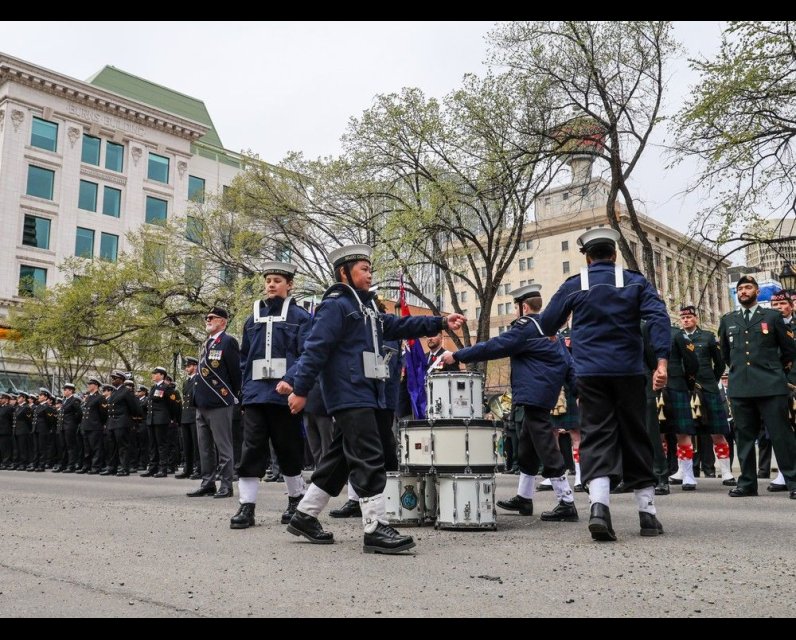Source Feed: National Post
Author: Chris Lambie
Publication Date: May 25, 2025 - 08:00
Cadets should be mandatory for young Canadian newcomers, says former honorary colonel
May 25, 2025

Canada should make it mandatory for young newcomers to join the cadet corps to learn more about this country’s history and values, says the former honorary colonel of the Royal Hamilton Light Infantry.
“We have to get to a point where you have to serve the nation somehow, somewhere, sometime during your life,” said Donald Cranston, a senior investment counsellor with Fiera Capital, who just stepped down last week from the honorary military appointment.
Canada gained more than 483,000 permanent immigrants in 2024, the highest number this country has seen since 1972. Cranston believes that if the people in that group between the ages of 12 and 18 joined Cadets Canada, a youth program that’s a partnership between the Department of National Defence and civilian organizations, it could help them find their feet here.
Joining the cadets would help newcomers with “better inclusion into society,” Cranston said.
“I’m a big believer in multi-ethnicity; I’m not a big believer in multiculturalism because this is why we have such divides in our society,” he said.
Cadets would serve as “an integrator” for young newcomers, Cranston said. “We’re more alike than we are different, but people focus on the differences all the time.”
Cadets would also provide young newcomers with a structured environment and leadership opportunities, he said.
“You’d get some push-back for sure,” Cranston said, noting most of that would come from “the left peaceniks that are out there.”
Canada has about 52,000 army, sea and air cadets. Youngsters often join to improve their physical fitness, learn life skills and explore an interest in the Canadian Armed Forces, though they aren’t expected to join the military.
“It is probably one of the most under-appreciated and under-recognized programs in Canada,” Cranston said.
One of his first exposures to cadets involved reviewing a group of them at the John Weir Foote Armoury in Hamilton about eight years ago.
“I was amazed by how much of the cadet program was made up of young newcomer Canadians,” Cranston said.
“They were from South Asia, some from the Caribbean, some from the Middle East. It was a real smorgasbord of Canadians.”
When he asked immigrant parents why they’d enrolled their kids in cadets, “the overwhelming response was, one, they view this as a good leadership program for their children. Secondly, it’s giving back to the institutions that helped build this country.”
Cadets acts “as a school of citizenship for these young Canadians,” Cranston said. “They learn about, not only military stuff, but they are given civics lessons as well.”
But the military has shown “a reluctance” to promoting the cadet program, he said.
Cranston chalks that up to fears about appearing to court or recruit child soldiers.
But the untapped potential, especially for newcomers, is huge, he said.
Joining cadets lends young people “confidence and leadership skills,” Cranston said.
“You are building the future leaders of Canada through these programs because, as they come up through the ranks and are promoted within the cadets, they are taking on more and more responsibility.”
About 70 per cent of Toronto’s cadets are “noticeable minorities,” with a sizeable chunk of those being newcomers, said Paul Preikschas, executive director of Ontario’s Army Cadet League.
“It gives them the boost to be part of something bigger as opposed their own little enclave,” Preikschas said.
Still, “one of the biggest challenges we have is newcomers that don’t know about cadets,” he said.
It’s often word of mouth “from fellow family members or community members” that brings them in, Preikschas said.
“You get people coming in from countries where it’s basically a police state — they want to try and stay as far away from us as possible because they think we’re tied to the military and police,” he said. “So, it’s sometimes hard to break that barrier.”
Cadets still learn how to march and shoot straight, he said.
Each branch also gets specialized training, with sea cadets learning seamanship skills and how to sail, and army cadets focusing on adventure training. Air cadets study aviation basics and some of them learn to pilot gliders as well as engine-propelled aircraft.
Army cadets in Ontario get to go mountain biking and trekking, Preikschas said. “We sent cadets up to one of the base camps at Mount Everest for one of their advanced camps.”
Summer training could involve cadets travelling to Alberta or Quebec, he said. “This builds confidence so much that it’s just unbelievable…. It’s something that they would never get as a regular teenager.”
The cadet organization aims to encourage and develop physical fitness, leadership skills, engaged and active citizenship, and personal health and well-being.
“The program is built on youth teaching youth,” Preikschas said.
“It’s senior cadets teaching these classes. So, you’re listening to someone that is a couple of years older than you. You’re not getting some 50-year-old guy telling them how to march. If you’re coming in at 12, you could have a 15-year-old telling you how to march.”
Cadets turns out teens who “are ready to take on the world,” Preikschas said. “They have the confidence; they have the learning ability to know that they don’t know everything yet, and they’re willing to learn and they’re willing to listen. It’s not all about their cellphone.”
Army and sea cadets are free to join. Some air cadet units charge a moderate fee.
“The program is usually based on the school year, so from September to June,” Preikschas said. “July and August are left open for summer training opportunities.”
The commitment involves one night a week of training and “the odd weekend,” he said.
“Sometimes it’s two nights a week; they might have their regular training on a Tuesday, and they might have their marksmanship, or drill or band on a Thursday.”
Time in the cadets impresses prospective employers, Preikschas said.
“Your resume is put at the top of the pile right away,” he said.
“If you were a cadet, you know how to show up on time, you know how to follow instructions. These are … things that will project outside of the world of cadets into your real life.”
This is the latest in a National Post series on How Canada Wins. Read earlier instalments here.
Our website is the place for the latest breaking news, exclusive scoops, longreads and provocative commentary. Please bookmark nationalpost.com and sign up for our daily newsletter, Posted, here.
OTTAWA — Liberal MPs are holding their first caucus meeting in Ottawa since their election win nearly a month ago, on Sunday afternoon to set the priorities for the new legislature.
The House of Commons will be back for four weeks before the summer break. During that time, MPs will have to elect a new Speaker, hear King Charles III read the Speech from the Throne and the government is expected to table legislation on its key economic priorities.
Those include enacting a middle-class tax cut, which the government has said would provide a family of four up to $840 of benefits, and...
May 25, 2025 - 12:00 | Catherine Lévesque | National Post
A mediator will be on hand to work with the parties who have been deadlocked for months in efforts to secure a new collective bargaining agreement.
May 25, 2025 - 11:33 | Globalnews Digital | Global News - Canada
OTTAWA — Conservative Leader Pierre Poilievre will welcome the new House of Commons session with a speech to his MPs on Sunday afternoon.
The Conservatives are still reeling from an election loss to Prime Minister Mark Carney’s Liberals, which was made all the more devastating because the Tories were leading by more than 20 percentage points at the beginning of the year.
The party has yet to confirm if it will be doing an official review of the campaign to determine if lessons can be learned for the next election, but some MPs have said that they...
May 25, 2025 - 11:25 | Stephanie Taylor | National Post




Comments
Be the first to comment